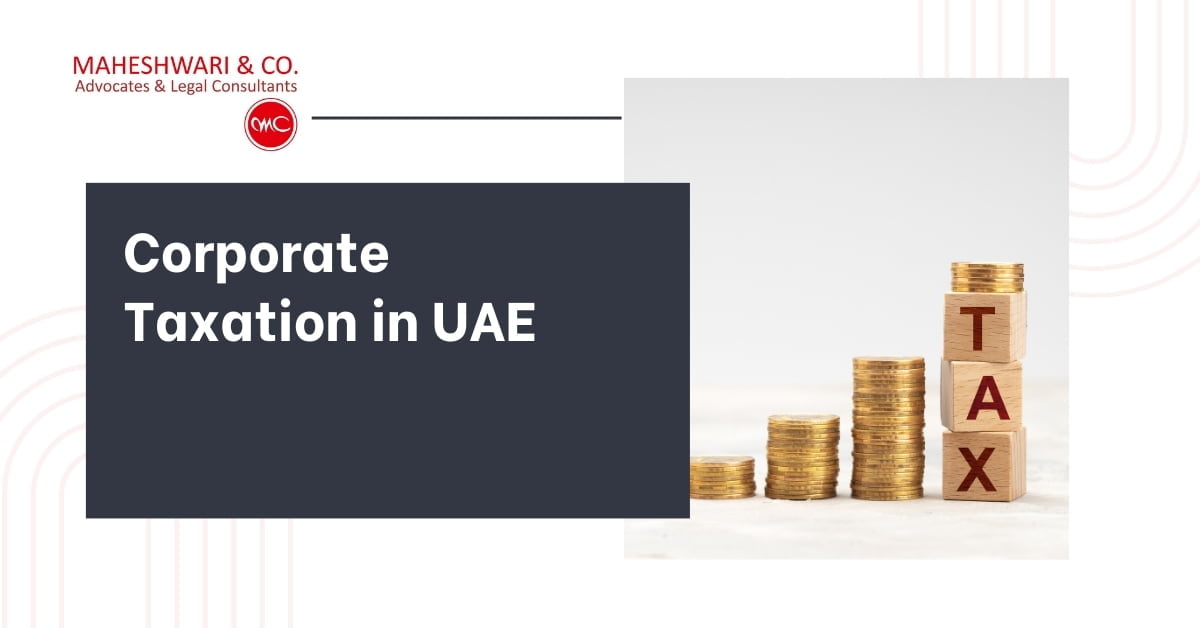According to the UAE Federal Decree-Law No. 47 of 2022 on taxation of corporations and businesses (the “Corporate Tax Law”), businesses will become subject to UAE Corporate Tax from the beginning of their first financial year that starts on or after 1 June 2023.
UAE was always considered as a tax-free zone. However, following the implementation of indirect taxes in 2018, the United Arab Emirates (UAE) Ministry of Finance (MoF) recently published the Federal Decree – Law No.47 of 2022 on 9th December 2022 establishing the Corporate Tax (CT) regime in UAE. The introduction of CT regime is basically with an objective of fulfilling commitment to meet international standards for tax transparency, implementation of Pillar 2 of OECD BEPS project and prevent harmful tax practices in the country.
UAE CT Law is based on internationally accepted principles to ensure efficiency, transparency, and Predictability. The intent of the UAE CT Law is to achieve strategic objectives and accelerate UAE’s development and transformation and to strengthen its position as a leading destination for business and investment.
The UAE CT Law is comprehensive yet concise. It contains anti-abuse provisions, exemptions, and various benefits for businesses. The Law shall be effective from 1st June 2023 and shall apply to specified individuals and corporate entities. With a headline tax rate of 9%, UAE CT law requires taxable persons to register with the Federal Tax Authority (FTA) and undertake compliances on an annual basis.
Natural persons were not required to pay any tax on income earned in the UAE prior to the implementation of the CT Law. Now, the CT Law stipulates that natural persons who participate in any kind of business or commercial activity fall under its jurisdiction and must pay tax on their income in the UAE. It should be highlighted that people who receive income from sources other than businesses or commercial activity are still exempt from CT Law. A “taxable person,” or a person who is subject to corporation tax under the stated Law, is one who is covered by the CT Law. Both residents and non-residents of the UAE are considered “taxable persons.”
When will a Non-Resident person be subject to CT?
If a non-resident individual has a permanent establishment in the UAE or receives revenue from the UAE, they are liable to UAE CT.
Generally, revenue generated from a UAE resident, a UAE Permanent Establishment, or from operations carried out or from assets placed, cash invested, or rights utilised in the UAE will be regarded as coming from the UAE.
How to determine whether income is derived from the UAE or not?
Income will be deemed to have derived from the UAE, if:
- The income is derived from a UAE resident.
- The income derived is associated with a Permanent Establishment in the UAE of a non-UAE resident.
- The income is sourced from activities conducted, assets located, capital invested, rights utilized or services carried out in the UAE.
What do you mean by Permanent Establishment?
Generally, a foreign person will have a Permanent Establishment in the UAE if:
- It has a fixed or permanent place in the UAE through which the business of the foreign person is carried on; or
- There is a person who has and habitually exercises an authority to conduct business in the UAE on behalf of the foreign person.
- A fixed place of business would not be considered a Permanent Establishment if it is used solely to store, display or deliver goods or merchandise belonging to the foreign person or to conduct any activities that are of a preparatory or auxiliary nature.
- A Permanent Establishment would not arise if the person who has and habitually exercises an authority to conduct business in the UAE on behalf of the foreign person acts as an independent agent.
- Where relevant, the application of an international agreement should be taken into consideration when determining whether a permanent establishment exists.
It’s worth mentioning that certain specific industries and activities may be subject to taxes or fees. For example, companies operating in the oil and gas sector, banking and financial services, and branches of foreign banks may be subject to specific taxes or levies. Additionally, businesses engaged in activities like oil exploration, production of hydrocarbons, and the extraction of other natural resources may be subject to taxes and royalties.
It’s important to reiterate that tax regulations can change, and the UAE may introduce new tax laws or amend existing ones in the near future.
Author – Diksha Agarwal (CA| Advisor- Taxation) and Akhil Agarwal (CA| Advisor- Taxation)






